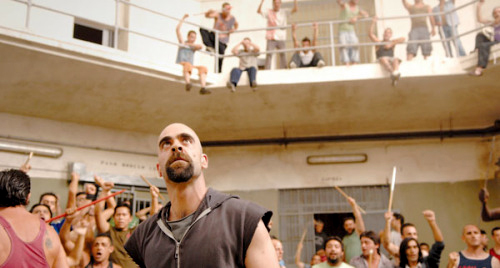|
Reviews of Recent Independent, Foreign, & Documentary Films in Theaters and DVD/Home Video

CELL 211 When the New York State Police stormed Attica during the riot of 1971, the 39 dead included 10 prison guards. By all accounts, the strike force did not discriminate between the prisoners and their hostages. If the guards had known what was coming, they might have found a lot in common with their captors. Led by a gravel-voiced skinhead named Malamadre (Luis Tosar), the rioters in Cell 211 hold three Basque terrorists as hostages and some precious political clout as a result—they will kill them off if their demands aren’t met. Their actions are a backlash against the head guard, Utrilla (Antonio Resines), who rules the facility with an iron fist. What turns the premise from a headline to a movie is Juan Oliver (Alberto Ammann), a prison guard on his first day on the job who ends up behind bars and masquerading as a prisoner so as not to become a hostage after the riot takes hold. Juan begins as an earnest double agent in a series of set pieces that can’t help but recall more leaden versions of similar Hollywood films, but as events inevitably go to hell, Juan’s performance as a rabble-rouser becomes less of an act. It’s a credit to actor Alberto Ammann that such loaded moments don’t become forced. By the end, Juan’s been an inmate longer than he was a guard, and he has more than enough cause to change teams. To back him up, director Daniel Monzón pits the prison guards against friends and family on the outside (including Juan’s pregnant wife), clamoring for news of their loved ones, which adds an appropriate note of chaos to a movie that easily could have been only about the strained virtues of law and order. They’re not so virtuous here. Tellingly, Juan’s previous job was in a slaughterhouse, so clearly he’s resigned to the ugly side of the world. But that doesn’t mean he’s complacent. It’s only natural that he should feel less fraternity with his superiors than with the men who are trying to push back against brutality. He’s more powerful leading a riot than walking the halls with a baton. Attica is the American
reference point, but the script is loaded with references to similar
Spanish troubles. At its best, it earns them. The script is solid—from
co-writer
Jorge Guerricaechevarría, also behind Pedro Almódovar’s Live Flesh—but it feels stretched in some places (the
procedural first act) and rushed in others (the anemic climax), as if it
had dodged too many obstacles on the way to the screen. (Memo to Monzón:
the peanut gallery wants more long takes, less frantic cuts). But given
the strained budget, it’s an impressive work.
Russell Brandom
|

